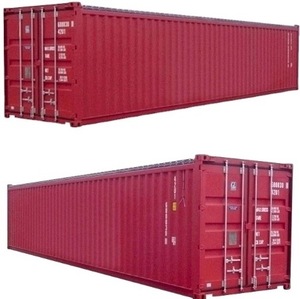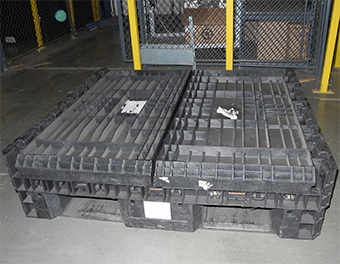The ultimate guide to used bulk containers for transporting goods safely
Why Mass Containers Are Vital for Sustainable and Cost-efficient Transport
Bulk containers play a necessary duty in modern-day logistics. They assist in the effective movement of huge quantities of goods, thereby optimizing transport procedures. This method not only lowers prices yet also lessens environmental effect via reduced exhausts and waste generation. As industries look for more sustainable methods, the fostering of mass containers is ending up being increasingly substantial. What ramifications does this change hold for future logistics and supply chain administration?

The Advantages of Making Use Of Bulk Containers in Logistics
Bulk containers change logistics by enhancing performance and sustainability. These containers enable the transport of big quantities of goods in a solitary journey, noticeably lowering the variety of trips required. This not just streamlines procedures however additionally reduces labor prices connected with handling, loading, and discharging. On top of that, bulk containers are designed to optimize space utilization within transport automobiles, guaranteeing that even more products can be delivered concurrently.
The standardization of mass containers additionally streamlines the logistics process. With uniform dimensions, they can be easily piled and stored, resulting in improved stockroom administration. In addition, bulk containers usually include resilient products that safeguard contents from damage throughout transportation, consequently reducing product loss and boosting general reliability. Consequently, services can experience boosted supply chain performance, ultimately causing raised productivity and customer contentment. This combination of variables makes mass containers a crucial possession in contemporary logistics.
Environmental Effect: Minimizing Waste and Carbon Footprint
As markets progressively focus on sustainability, the fostering of mass containers has become a crucial method for lowering waste and lowering carbon impacts. These containers lessen making use of packaging products, such as boxes and plastic, thereby significantly reducing general waste generation. By consolidating deliveries, mass containers improve transportation efficiency, allowing for even more items to be delivered per journey. This reduction in trips straight associates with reduced greenhouse gas discharges, adding to a smaller carbon footprint.
Additionally, bulk containers can typically be reused or recycled, additionally mitigating environmental effect. The toughness of these containers guarantees they can stand up to numerous transportation cycles, reducing the need for single-use alternatives. used bulk containers. By streamlining logistics and promoting efficient resource usage, bulk containers not only support lasting techniques however likewise motivate markets to line up with global ecological goals. Inevitably, their execution mirrors a dedication to ecological stewardship and accountable source management
Expense Financial Savings: Exactly How Bulk Containers Lower Transportation Costs
While lots of companies seek means to enhance their profits, the usage of mass containers offers a substantial chance for lowering transportation expenditures. Mass containers make the most of the volume of goods transported, permitting services to deliver larger quantities at once. This efficiency lowers the variety of journeys called for, straight reducing fuel prices and decreasing labor expenditures connected with loading and discharging.
In addition, bulk containers frequently feature structured designs that maximize space use within transport automobiles. This indicates less voids, causing extra effective use offered ability. The toughness of bulk containers can reduce the threat of item damages throughout transit, minimizing losses and making certain that even more products arrive undamaged.
Enhancing Supply Chain Efficiency With Bulk Storage Space Solutions
Mass storage space solutions play a vital duty in boosting supply chain efficiency by enhancing inventory administration. By combining goods right into less, bigger containers, services can significantly decrease handling prices connected with frequent transfers and processing. This structured strategy permits better monitoring and management of supply, eventually causing improved operational performance.
Structured Supply Monitoring
Efficient stock administration is crucial for enhancing supply chain operations, especially when organizations adopt bulk storage space remedies. These solutions allow companies to keep greater supply degrees while decreasing the regularity of replenishment. By settling materials into mass containers, companies can simplify their stock processes, lowering the complexity connected with tracking several smaller packages. This technique helps with exact supply matters and enhances forecasting accuracy, allowing for even more educated decision-making. Furthermore, bulk storage remedies streamline stockroom company, making it less complicated to locate and gain access to items when needed. Therefore, companies can achieve an extra efficient supply turn over rate, ultimately boosting overall supply chain performance and reducing the probability of stockouts or overstock situations.

Minimized Handling Expenses
The application of mass storage space solutions not go to the website only improves inventory management but also substantially minimizes handling costs throughout the supply chain. By consolidating products right into mass containers, firms minimize the requirement for frequent handling and transfer in between different storage and transport devices. This strategy reduces down on labor costs related to loading, dumping, and moving smaller packages. In addition, mass storage space minimizes the frequency of deliveries, leading to lower transport costs and decreased fuel intake. Because of this, organizations can maximize their logistics procedures, permitting a much more efficient allocation of sources. Inevitably, decreased taking care of prices add to enhanced overall supply chain performance, cultivating an atmosphere that sustains both sustainability and economic viability.

Versatility of Bulk Containers Throughout Various Industries
Although many industries have distinct requirements for transport and storage, bulk containers have actually become a functional remedy that fulfills a wide variety of requirements. These containers, varying from huge bins to specialized tanks, can accommodate diverse products, including granules, powders, and liquids. In the farming industry, bulk containers promote the transportation of plant foods and grains, while the food and drink market uses them for ingredients and ended up items. The chemical market relies upon bulk containers for safely delivering harmful materials, making certain conformity with safety laws. Additionally, building firms take advantage of mass containers for carrying accumulations and various other products. Their adaptability reaches different modes of transport, including trucks, ships, and trains, improving logistical effectiveness. This adaptability not only enhances operations across various fields however also promotes sustainability by minimizing product packaging waste and enhancing area en route. Bulk containers play a crucial duty in contemporary supply chain administration.
Future Trends in Bulk Container Use and Sustainability
The future of mass container usage is significantly formed by cutting-edge products advancement that boosts sustainability. Additionally, automation in logistics promises to simplify operations, minimizing waste and improving effectiveness. Welcoming round economic situation practices will additionally transform how bulk containers are developed, utilized, and reused, fostering an extra sustainable transport landscape.
Cutting-edge Materials Development
As markets significantly prioritize sustainability, innovative materials advancement in bulk containers emerges as a significant consider improving eco-friendly transportation solutions. Suppliers and scientists are checking out naturally degradable plastics, recycled composites, and lightweight steels to reduce environmental impact. These materials not just lessen waste yet likewise boost fuel performance by decreasing the overall weight of containers. Additionally, developments in wise products, which can adjust to differing conditions, enhance the longevity and functionality use this link of mass containers. The integration of these ingenious products lines up with round economic situation principles, promoting reuse and recycling. As the need for lasting techniques grows, the growth of such products will certainly play a vital duty in shaping the future of mass container usage in logistics and transportation.
Automation in Logistics
Substantial advancements in automation are positioned to change logistics and the application of bulk containers, boosting sustainability in transportation. Automated systems, including drones and independent cars, are enhancing the activity of bulk containers, decreasing the dependence on traditional fuel-powered transport. These innovations maximize directing and loading processes, minimizing vacant miles and enhancing gas effectiveness. Additionally, automated supply management systems boost tracking and surveillance of bulk containers, guaranteeing better resource allotment and minimized waste. The integration of the Web of Things (IoT) enables real-time information analysis, enabling positive decision-making that straightens with sustainability goals. As automation remains to evolve, it is expected to drive better developments in bulk container use, eventually sustaining even more sustainable logistics Going Here practices and decreasing the ecological impact of transport.
Circular Economic Situation Practices
Improvements in automation are setting the stage for a more integrated technique to circular economic climate practices in the domain name of bulk container usage. As industries progressively welcome sustainability, bulk containers are being designed for durability and reusability. This change not only reduces waste however also improves resource effectiveness. Firms are adopting methods such as closed-loop systems, where used containers are collected, reconditioned, and reestablished right into the supply chain. Furthermore, wise modern technologies track container life cycles, assisting in much better monitoring and decreasing environmental effect. The collaboration in between manufacturers, logistics providers, and end-users is important in establishing standards for lasting container use. used collapsible containers. Future patterns suggest a growing focus on products that are recyclable and eco-friendly, additional enhancing the circular economy's concepts wholesale transport

Regularly Asked Inquiries
What Materials Are Bulk Containers Generally Made From?
Bulk containers are normally built from durable products such as high-density polyethylene, cardboard, steel, and aluminum. These products offer stamina, flexibility, and security, making them suitable for moving different goods in various sectors successfully.
Just how Do I Choose the Right Dimension Mass Container?
Selecting the appropriate size mass container involves reviewing the volume of products to be transferred, thinking about managing devices compatibility, and assessing storage area demands. Correct size warranties effectiveness in transportation and lessens waste during shipment.
Are Bulk Containers Reusable or Recyclable?
Mass containers are often multiple-use, developed for several journeys, boosting sustainability. Many can likewise be recycled, depending upon the products used. Selecting recyclable alternatives further supports ecological objectives and lowers waste in transport techniques.
What Safety Rules Put On Mass Container Transport?
Safety policies for mass container transport consist of compliance with the Division of Transportation standards, correct labeling of hazardous products, architectural integrity evaluations, and adherence to weight limitations to guarantee risk-free handling and protect against crashes during transportation.
Exactly How Can Businesses Change to Making Use Of Bulk Containers Effectively?
Services can transform to bulk containers by examining current logistics, training team on handling, buying ideal equipment, optimizing inventory management, and teaming up with providers to ensure compatibility and performance throughout the supply chain.
As industries progressively focus on sustainability, the fostering of bulk containers has arised as a key technique for lowering waste and lowering carbon footprints. By consolidating products right into mass containers, firms can streamline their stock procedures, reducing the complexity associated with tracking multiple smaller bundles. As markets progressively focus on sustainability, cutting-edge materials advancement in mass containers arises as a significant aspect in enhancing green transport services. Automated systems, consisting of drones and autonomous vehicles, are streamlining the motion of mass containers, lowering the dependence on traditional fuel-powered transport. In addition, automated inventory management systems improve monitoring and monitoring of mass containers, guaranteeing better source allocation and lowered waste.